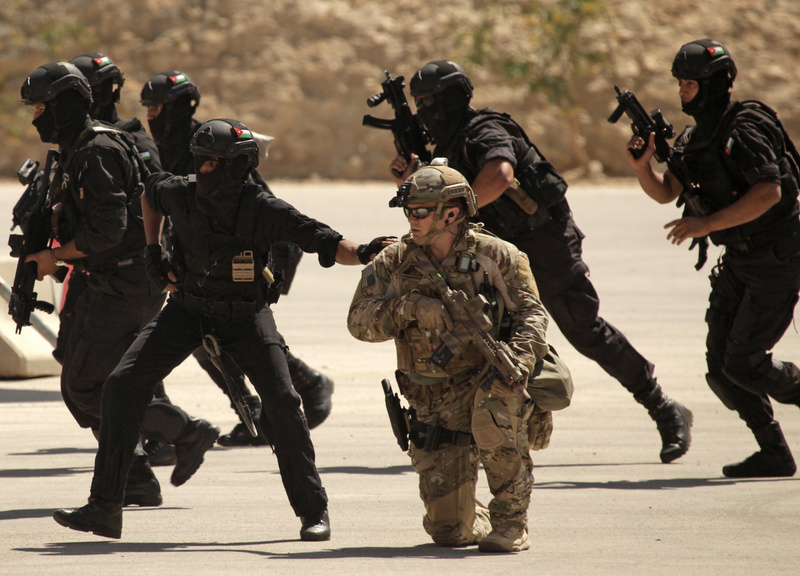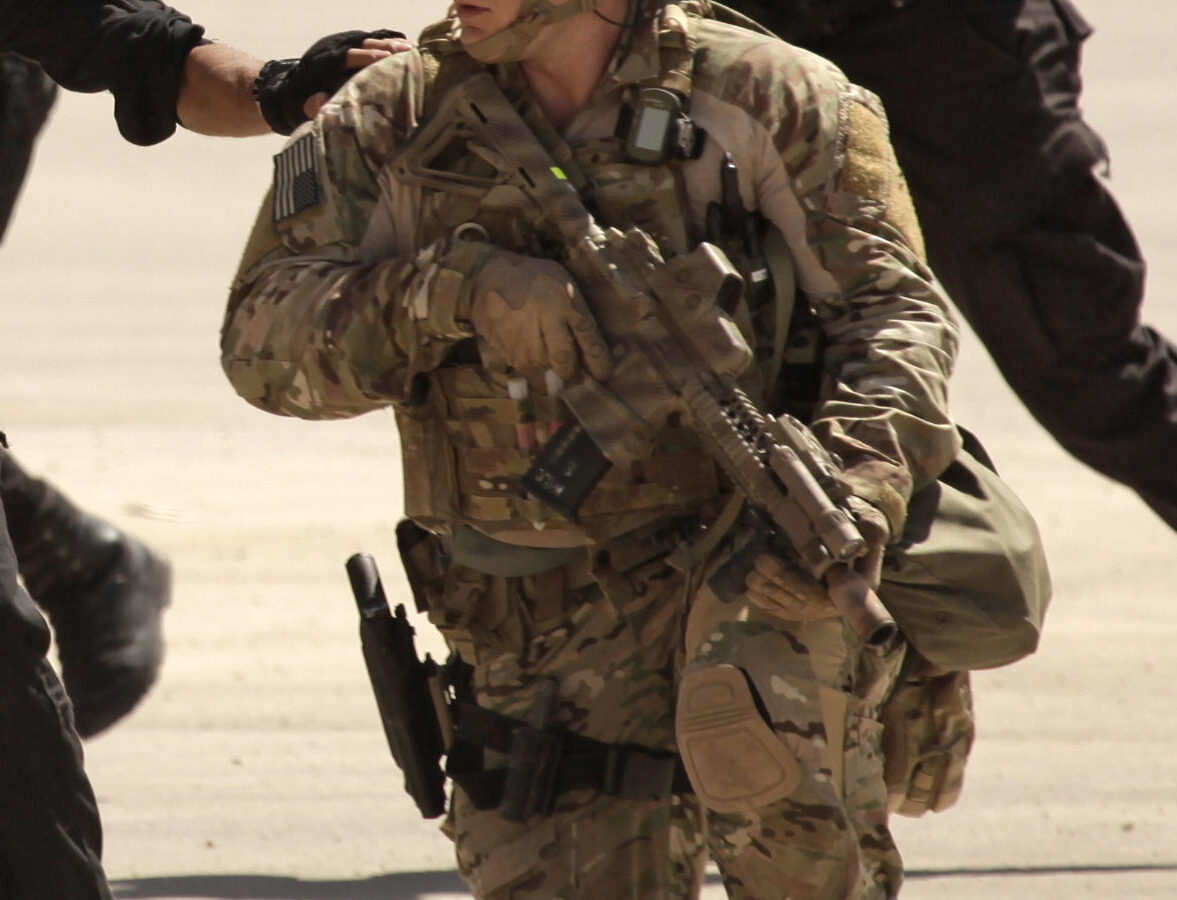
The U.S. has asked Spain if it can expand an already 500-strong Marine rapid-reaction force for Africa by a minimum of 50 percent, along with extending its presence at the current base by another year, according to a report by a Spanish newspaper on Monday.
Recent events in Mali and Libya have partly motivated the move to strengthen the force.
The Marines stationed at the Morón de la Frontera air base — officially called a Special Purpose Marine Air-Ground Task Force — were positioned there in the wake of the attack on the U.S. Consulate in Benghazi, Libya, in 2012. Since then, the base has become a strategic tool for AFRICOM, the U.S. command dedicated to the African continent, headquartered in Stuttgart, Germany.
Though AFRICOM handles training and humanitarian duties in various parts of the continent, more urgency has been placed on response times to threats and crises affecting American interests along the Mediterranean-North African region.
The request to expand the Marines’ presence in Spain was presented when the country’s prime minister visited the White House just last week. According to El Pais, “President Obama referred to this obliquely when he said that ‘we thanked the prime minister and his government as well as the opposition in Spain for the support they have for our work together, including hosting some of our military operations and facilities. … And we pledged to continue to try to improve and deepen what is already a very strong defense relationship.’”
Spain first gave its permission for the deployment of 500 U.S. Marines and eight aircraft to the Morón base in April 2013. But the request has raised the issue of how “temporary” is defined, especially in regard to a military presence designated to last at least two years and considering America’s history with opening open-ended military sites around the world.
The expansion of the base could increase the number of soldiers up to 900, the maximum allowed by the agreement, which does not establish any control by the Spanish government over the U.S. military troops or their organization.
Force at Morón base not the only one for Africa
Although the base in Spain is needed by the U.S. and Europe for that matter, it is not the force America has dedicated to Africa. Another, in the Horn of Africa, has been doing a lot of heavy lifting for years.
First opened in 2001, Camp Lemonnier — a multi-branch base in the tiny nation of Djibouti — has done much to help in AFRICOM’s work. But the Spanish and Djiboutian bases can work in tandem with each other.
For example, U.S. military quick-reaction forces based at Lemonnier first left for South Sudan on Dec. 14 to evacuate diplomats at the embassy in the capital of Juba as the newest crisis to afflict that country broke out. Meanwhile, Marines stationed the Morón base have deployed to Djibouti and Uganda to help in the evacuations, too.
Events during 2013 in the West African nation of Mali, the Horn of Africa’s Somalia, Kenya, South Sudan, the Central African Republic, and a manhunt for rebel fugitive Joseph Kony — on the run for decades — has forced the U.S. to reconsider its dedication to the continent.
Lemonnier is home to at least 3,200 U.S. troops, civilians and contractors, although that number is thought to have risen recently in light of events in South Sudan, as many U.S. troops from Spain were moved to Djibouti, thus precipitating the need for more troops in Spain. Surveillance drones routinely fly from the base in Djibouti over Somalia, too, scouting for al-Shabab Islamists bases, as do other intelligence aircraft.
On Sunday, U.S. Air Force personnel — though not part of AFRICOM officially — airlifted a Rwandan mechanized army battalion from Kigali, Rwanda’s capital, to Bangui, Central African Republic, at the request of the French government to support an African Union effort to contain various rebels and factions fighting each other in the troubled nation.
Worries about helping U.S. State Department missions in Africa
The mission at the Spanish base grew deep when the Congress and White House realized there was no appropriate force available to respond to the vast, ungoverned lands of North Africa. Though the East African Response Force was set up in Djibouti, it would not be able to effectively respond to events like those that unfolded in Benghazi in 2012, in which four Americans, including the U.S. ambassador, died.
Additionally, critics have argued that AFRICOM’s headquarters in Germany is far from where it would need to be, regionally speaking. Although quick air support might be provided in a relatively short amount of time in a crisis, slower transport planes carrying troops might not respond as effectively in an emergency.
According to a Stars and Stripes newspaper report published last week, “Congressional hearings held in the wake of the Benghazi incident, Dempsey and other senior defense officials argued that a rescue operation was not feasible after the attacks began due to poor intelligence about the situation on the ground and a lack of sufficient quick-reaction military assets in the region that could have gotten to Benghazi in time to save those who died.”
In effect, even assets in Germany would have not responded in a timely manner, hence, the mission in Spain was set up.
Some Spaniards approve of U.S. troops on their soil, but not all
The Spanish are suffering through a dire economic downturn via austerity measures imposed by the European Union. There are some Spaniards in favor of the U.S. base, saying it brings jobs and increases economic activity to small businesses in the area around Morón.
Under Spanish Dictator Francisco Franco, Spain and America signed several agreements to house U.S. military forces at Morón de la Frontera air base.Spaniards have protested against U.S. bases in Madrid throughout the years.
For instance, back in the mid 1980s, more than 50,000 Spaniards protested, demanding the government shut down all U.S. bases in its territory and to pull out of NATO. Spaniards have also protested against the invasion of Iraq and Afghanistan in recent years. Will Spaniards protest against U.S. intervention in Northwest Africa?
However, another U.S. military base in Spain — Naval Station Rota — has existed since 1953. The regular Spaniard citizenry may not know it, but having the U.S. military presence could help stave off the threat of terrorism in its own country. After all, it was only 2004 when al-Qaida-linked terrorists carried out the train bombings in Madrid. Certainly that is still fresh on Spaniard minds.


